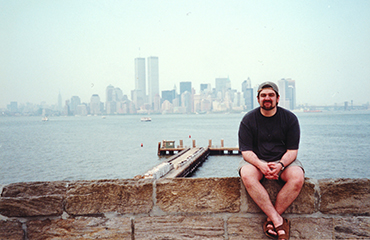
It’s been nearly 24 years since the terrorist attacks on the morning of September 11, 2001, shook the nation and changed the life of the world.
Yet, it was on Sept. 12 that the world really changed, recalls Blaine Hicklin, a Lander University videographer, who was an eyewitness to the terrorist attacks and the aftermath of the disaster in New York City.
For Hicklin, who was living in New York after graduating from Lander in 1990, the morning began early. An employee at the Merrill Lynch Video Network, which was adjacent to the World Trade Center, Hicklin vividly remembers how beautiful the day was. “Almost anyone will tell you, it was a beautiful day … the first crisp morning since summer. The sky was a perfect shade of blue.”
Unfortunately, the serenity of the early morning didn’t last long. On his subway ride from Queens, which is east of Manhattan, Hicklin remembers feeling a jolt or bump as the subway ride was ending. It was probably about the time – 8:46 a.m. – when the first jet hit the World Trade Center’s North Tower.
As he was getting off the train, Hicklin said people standing at the exit leading to the World Trade Center mall appeared frozen, as if in shock. “I saw people running.”
His first thought was that there had been a bombing. He remembered a bomb exploded under the North Tower in 1993.
Then, he saw “trash blowing, and there were chunks of debris on the subway steps. I looked up at the subway exit and saw glinting objects against the sky. Then, I realized it was paper. With my eyes, I followed the paper trail to the World Trade Center.”
Conversations among people speculated that a plane had crashed into the building, and a line was beginning to form at pay phones in the area. “Not too many people had cell phones in those days, so people were lining up to make calls.”
Hicklin was one of the fortunate ones to be able to find a phone. When he called his parents in South Carolina, they didn’t answer. He called a friend and told him to let his parents know that he was OK.
Then, only a few minutes later, the second jet hit the South Tower. “At that point, we knew that this was an attack,” Hicklin said. “I’ll never forget the sound of the jet hitting the building.”
By then, people began fleeing the area. “In 10 minutes, you saw the best and the worst of humanity,” Hicklin said, recalling a businessman stopping to help a woman who had fallen in the street. “New York is not equipped to handle a mass exodus.”
As he made his way across Manhattan to leave the city, Hicklin heard the South Tower fall, and then the North Tower. “Even across the island, as far away as I was, you could hear the popping sound of it coming down.”
The challenge continued: How would he get home, a distance of about 12 miles? Public transportation had come to a halt. His only way out was on foot. He was nervous as he walked past the United Nations building and again as he walked over the 59th Street bridge, which connects Manhattan to Queens.
He wondered if the places along his route could be targeted by terrorists, too. As people walked along, he was reminded of a scene of refugees – people looking tired and scared, and some covered in dust. He was worried about a friend who was working on the 90th floor of one of the buildings. Later, he learned that she survived the attack.
Eventually, he made it to his apartment and listened to the news throughout the day and evening. In the early morning hours of Sept. 12, he awakened to the smell of smoke. “I thought the apartment was on fire,” he said.
Hicklin went out into the street, about 2 a.m., to find about 30 people dressed in pajamas looking curiously into the air. “Smoke from the World Trade Center was wafting across the street,” he said. “It lasted a few days.”
On 9/11, people’s reactions were “fight or flight,” said Hicklin. “It was on September 12, however, that the world changed. Life as we knew it had ended.”
In the days that followed, his church held services and prayer vigils. “It was a roller coaster emotionally,” he said, noting that he never thought of leaving New York at that time to return to South Carolina. “New York had become my home. We had such a sense of unity in the weeks and months that followed.”
Merrill Lynch moved its operations to Princeton, New Jersey. Hicklin went back to work, a three-hour commute to and from each day. That schedule continued until May 2002.
“I hadn’t known anything about trauma until September 11,” he said.
Ultimately, “people’s lives went on,” Hicklin said. “Difficult experiences make us different people, but bring us together, too.”
Yet, as he stood in Manhattan on the morning of the terrorist attacks, “I knew that this day would be imprinted on my soul for the rest of my life,” he said.